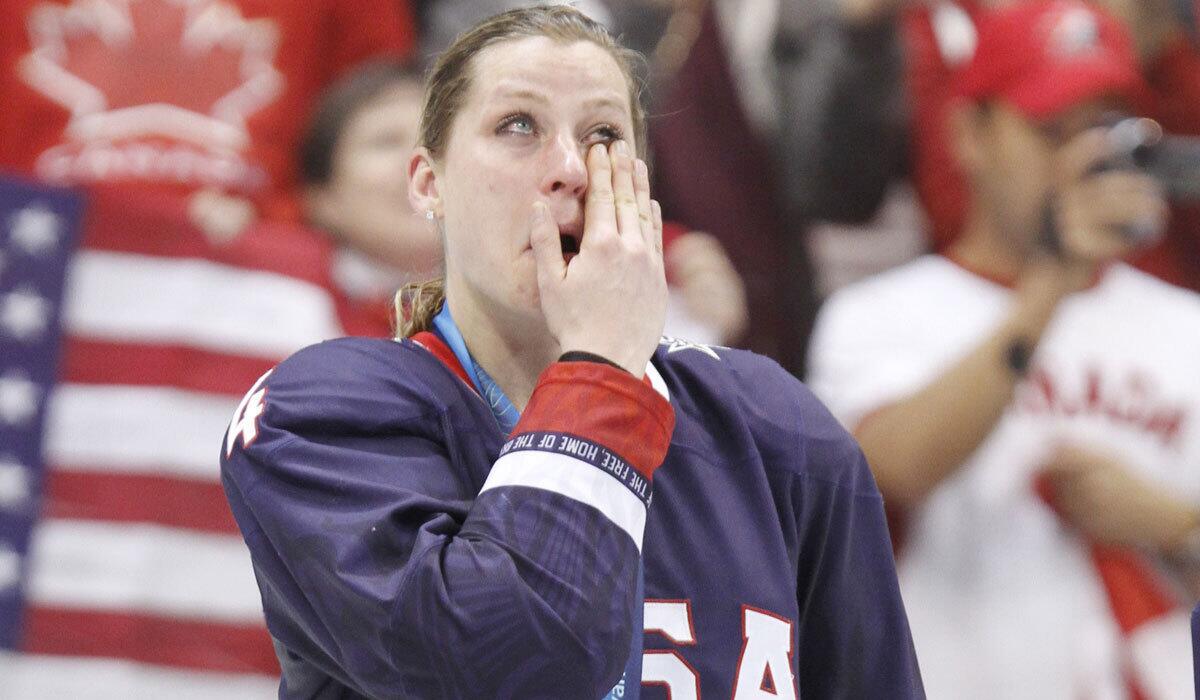LA 2024 Olympic bid gets an advocate on athletes’ commission, but so does Paris

- Share via
Reporting from Rio de Janeiro — Los Angeles’ bid for the 2024 Summer Games got some good news — and some not-so-good news — on Monday as the International Olympic Committee continued its meetings here.
Former U.S. hockey player Angela Ruggiero, who serves as chief strategy officer for the LA 2024 bid committee, was elected as the new chair of the IOC athletes’ commission.
In a world where connections can make all the difference, Ruggiero now leads a small group of athletes who will eventually take part in the vote to select the 2024 host.
She also earns a seat on the IOC’s influential executive board.
“It is an important time within the Olympic movement and our [athletes’] commission has a great responsibility,” Ruggiero said in a statement. “I will make sure our voices aren’t just heard but that they are effective and that we empower athletes around the world to do the same.”
If L.A. received a boost from the athletes’ commission election, so did rival bidder Paris — one of its leaders, former canoeist Tony Estanguet, was named vice chair of the commission.
Rome and Budapest are also contending for the 2024 Games.
IOC, WADA at odds
Relations between the IOC and the World Anti-Doping Agency appear to have chilled in the days leading up to the Games.
On Monday, WADA officials cancelled a news conference scheduled for later this week in Rio and issued a rebuttal to comments made by IOC President Thomas Bach.
Bach had questioned the urgency with which anti-doping officials pursued suspicions of widespread cheating among Russian athletes.
“WADA wishes to factually clarify that the agency acted immediately on allegations concerning Russia when it had corroborated evidence and the power to do so under the World Anti-Doping Code,” officials said in a statement.
At issue was the timing of a WADA report, published last month, that broadened the doping scandal and led to the agency’s suggesting that Russia be banned from the Games.
The IOC declined to issue a blanket ban, setting into motion a process by which the international federations that govern each sport consider every Russian athlete individually.
The last-minute rush to adjudicate scores of cases has led to some Russians being cleared and others being excluded. The exact composition of the team is still not decided.
On Sunday, Bach noted the turmoil as well as the timing of WADA’s latest report, saying “information which was offered to WADA already a couple of years ago was not followed up.”
WADA insisted that it initially pursued several leads but that corroborating evidence did not come to light until subsequent reports by “60 Minutes” and the New York Times.
Anti-doping officials had planned to address other topics at the Rio news conference but decided to cancel because those issues might be overshadowed by the ongoing Russian scandal.
You can lead a horse to water
The horses for the U.S. equestrian team will get special treatment at the Olympics over the next few weeks.
Given persistent concerns about Rio’s water quality, the team will have its animals drinking only filtered water.
“It’s something we’re keeping an eye on,” spokesman Leah Oliveto said. “But it’s not something we’re extremely concerned about.”
The riders will also take extra precautions after being briefed on the Zika virus outbreak in Brazil.
Zika is carried mainly by mosquitoes but can also be transmitted through sexual contact, and there have been reported cases of birth defects when pregnant women are infected.
Asked about the situation, eventing rider Boyd Martin said: “All of us are benched for two months after the Olympics with our respective partners.”
Go beyond the scoreboard
Get the latest on L.A.'s teams in the daily Sports Report newsletter.
You may occasionally receive promotional content from the Los Angeles Times.




